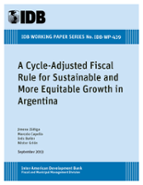A Cycle-Adjusted Fiscal Rule for Sustainable and More Equitable Growth in Argentina
Date
Oct 2013
This paper seeks to identify the most promising fiscal strategy to boost long-term economic growth in Argentina and quantify its effects. To this end, the authors updated a growth-diagnostics study for Argentina and corroborated that low appropriability of social returns and insufficient public infrastructure are key constraints to private investment. Further, low appropriability stands out among the key constraints to productivity-enhancing activities. Because low appropriability is largely rooted in macroeconomic volatility, the authors argue that a cycle-adjusted fiscal rule is one of the most promising fiscal reforms the country could implement to tackle this problem, and discuss the specific design features that such a rule could include. Then, the authors construct a model reflecting the stylized facts of the Argentine Republic's fiscal federalism structure to assess the effect that a cycle-adjusted fiscal rule, in different variants, would have on the volatility of key macro variables. The authors find that the rule would meaningfully reduce macroeconomic volatility, thereby contributing to improved appropriability and long-term growth.




